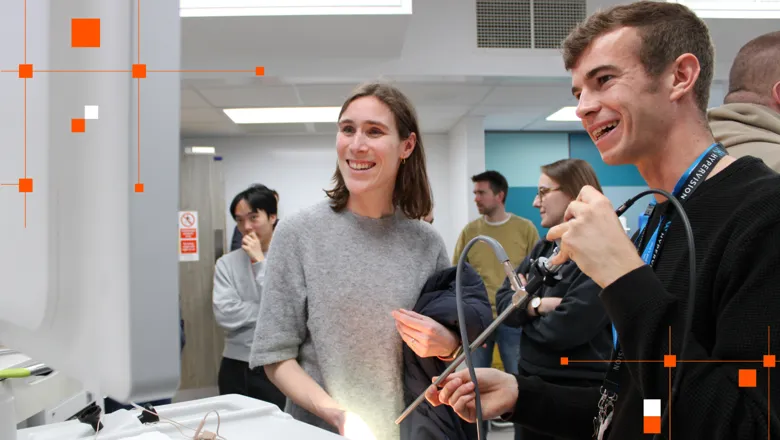The NeuroHSI and NeuroPPEye project are highly translational in nature. Our objective is to develop technology that addresses critical unmet clinical needs in a way that is acceptable to all stakeholders. Our supportive patient group has allowed us to go above and beyond what we would otherwise have been able to achieve in terms of lowering barriers to adoption.
Prof. Tom Vercauteren, Professor of Interventional Image Computing
06 May 2025
Neurosurgical studies using novel light-based imaging systems hold patient involvement day
Two neurosurgical studies led by the School of Biomedical Engineering & Imaging Sciences researching novel, light based, imaging systems that can be used to greatly improve the efficacy of future neurosurgical procedures ran a successful day of patient involvement.

Each year in the UK, approximately 70,500 patients are diagnosed with a brain tumour, 5,000 of whom undergo surgery. Even with the best hands and the most advanced technology currently available, it remains difficult to determine tumour from healthy brain tissue. Due to this uncertainty and the need to balance risks, some tumour is often left behind.
Today, close to 30% of brain tumour patients require repeat surgery owing to tumour left behind during their first surgery. Further surgeries are more difficult, pose additional patient risks and lead to increased healthcare costs with often poor patient outcomes.
Newly developed AI-enabled camera systems have the potential to enhance the surgeon’s vision to reliably identify tumour and healthy brain structures. Hyperspectral imaging (HSI) is one of the most promising of such technologies. Its core ability is to provide very detailed and rich light-based information that is invisible to the human eye.
Two research projects, NeuroHSI and NeuroPPEye, assessed whether the new technology is capable of obtaining helpful images for surgical guidance in the future. The NeuroHSI research project is funded by the National Institute for Health and Care Research (NIHR) and the NeuroPPEye project is funded by Wellcome [223880/Z/21/Z].
The projects were designed with patient input and feedback from various patient groups including The Brain Tumour Charity. They involved establishing a Patient Advisory Group to advise on all stages of the research.
The group include patients with first-hand experience of neuro-oncology and neuro-vascular surgery, providing a range of perspectives pertinent to the work. This collaborative approach not only helps in recruiting suitable participants but also ensures that the research addresses real patient needs and that findings are shared in a way that make sense to everyone.
Researchers, members of the public and patient involvement group and funders, came together to review the progress of these projects. A hands-on demonstration of the technology was organised for the Patient Advisory Group at the School of Biomedical Engineering & Imaging Sciences, Surgical and Interventional Engineering mock operating theatre.
The Patient Advisory Group have found our involvement in these exciting projects extremely interesting and rewarding. Being able to channel our experiences as patients and carers into projects which have so much potential to help those in our positions in the future is incredibly empowering.
Andrew Plowright, Patient Advisory Group chair
This technology has the potential to significantly improve safety and accuracy of surgery. Working with our inspiring and engaging patient group has been one of the project’s highlights; they have helped to steer this research at every stage.
Jonathan Shapey, Clinical Reader and Honorary Consultant Neurosurgeon


